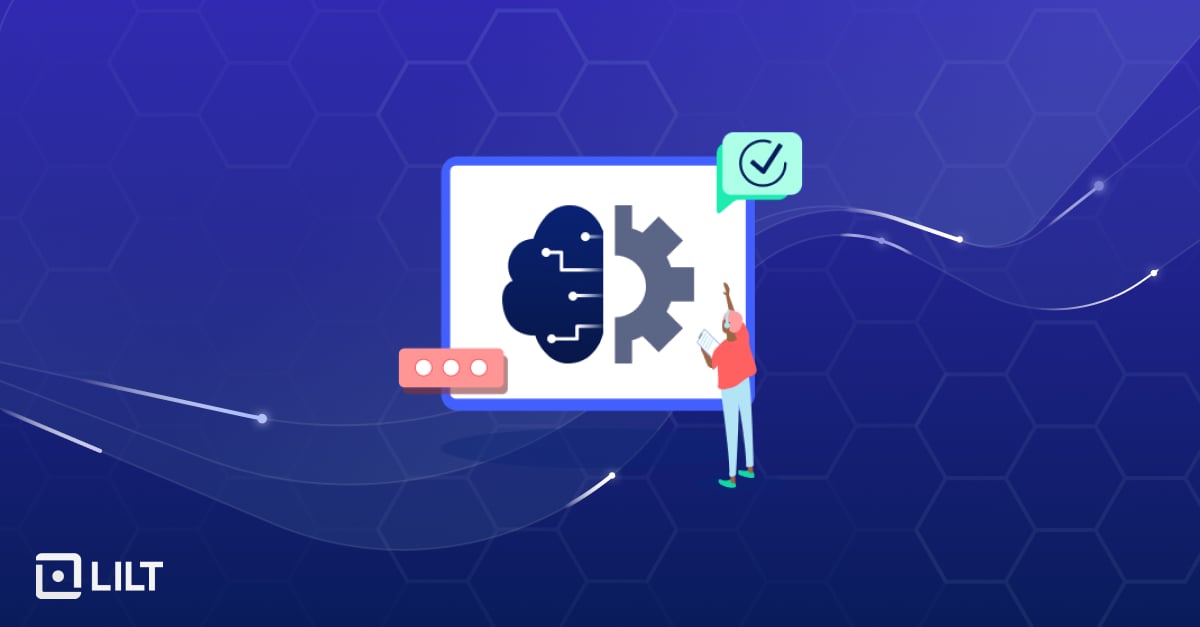[Webinar Recap] The AI Playbook for Enterprises

To help you understand AI, our experts have put together a playbook that shares the importance of AI and machine learning in the modern business world, the challenges of implementing AI, and the benefits it can bring to organizations. Led by Ash Fontana, the author of “The AI-First Company” and Spence Green, CEO of Lilt, this blog post follows a discussion on the following topics:
• Takeaway 1: AI can provide a competitive advantage for organizations by automating tasks and making more accurate predictions.
• Takeaway 2: AI systems can help organizations manage and process large amounts of unstructured data more efficiently.
• Takeaway 3: Implementing AI successfully requires a combination of technology, human expertise, and effective data management.

Takeaway 1: AI can provide a competitive advantage for organizations by automating tasks and making more accurate predictions.
AI is becoming increasingly important in the modern business world, with many organizations looking to leverage its capabilities to gain a competitive advantage. AI can bring numerous benefits to organizations, including improved efficiency, cost savings, and the ability to make better-informed decisions.
Ash Fontana discussed the concept of "data learning effect" as a source of competitive advantage for organizations. "A data learning effect is where you see an automatic compounding of information," he explained. This requires three key components: a critical mass of data, the capability to process it into information, and a system that can learn over that information automatically.
Fontana emphasized the importance of having a system that can adapt to changes in the real world, such as trends in language or customer preferences. "AI is all about helping you figure something out, make a decision, do something," he said. "It's a technology, therefore, it is constantly changing and adapting."
By adopting adaptive AI technologies, such as Contextual AI and human feedback, organizations can streamline processes and make more informed decisions. However, Fontana cautioned that it's essential to choose the right AI applications and tools for the specific needs of the organization. "It's so dependent. I mean, my annoying answer to the question is to try stuff," he advised.
Takeaway 2: AI systems can help organizations manage and process large amounts of unstructured data more efficiently.'
Spence Green shared the challenges that organizations face when dealing with large volumes of unstructured data that is non-tabular, such as text, images, and sounds. He mentioned that AI technologies can help process and organize this data more efficiently, allowing organizations to make better use of the information they have.
"Everyone's a capital allocator, whether your budget is $500 or $500,000. You have to think about how to deploy the resources you have in a way that's efficient," Fontana said. By implementing AI systems, organizations can save time and resources while improving the accuracy of their predictions and decision-making processes.
However, Fontana also emphasized the importance of choosing the right AI applications for the specific needs of the organization. "Try to pull something off the shelf, start with Googling, start with figuring that out, read the book, try to apply the frameworks," he suggested. This approach will help organizations determine which AI tools and technologies are most suitable for their needs and goals.
Takeaway 3: Implementing AI successfully requires a combination of technology, human expertise, and effective data management.
Ash Fontana stressed the importance of combining AI technology with human expertise to achieve the best results. "It's not just about building stuff. It's about before you purchase something and if you have enough data to make that product useful," he explained, “AI is best placed where it can operate in the background and not get in the way of us."
One of the challenges organizations face when implementing AI systems is managing and organizing the data effectively. Fontana suggested that using tools, such as integrations or Connectors, that can work with data in its existing format can help bridge the gap between powerful AI techniques and the organization's current data structure. It’s important to remember that humans still play a crucial role in AI systems, as they are often needed to correct errors and ensure the accuracy of the system's output.
In order to get the most out of AI systems, Fontana recommended taking a lean approach and focusing on the specific problems that AI can help solve. By carefully selecting the right AI tools and technologies and effectively leveraging Contextual AI, organizations can harness the power of AI to improve their processes and decision-making abilities. The best investments are made in AI technologies that are tailor-made for specific tasks and functions, such as content generation or translation.
.jpg?width=1356&height=207&name=Lilt-Blog%20CTA%20(3).jpg)


.png)